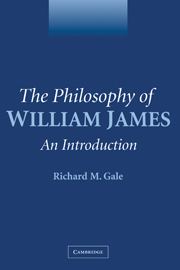Book contents
- Frontmatter
- Contents
- Preface
- Introduction
- PART I THE PROMETHEAN PRAGMATIST
- PART II THE PASSIVE MYSTIC
- 8 The Self
- 9 The I–Thou Quest for Intimacy and Religious Mysticism
- 10 The Humpty Dumpty Intuition and Backyard Mysticism
- 11 An Attempt at a One World Interpretation of James
- Bibliography of Works Cited
- Suggested Further Readings
- Index
9 - The I–Thou Quest for Intimacy and Religious Mysticism
Published online by Cambridge University Press: 06 January 2010
- Frontmatter
- Contents
- Preface
- Introduction
- PART I THE PROMETHEAN PRAGMATIST
- PART II THE PASSIVE MYSTIC
- 8 The Self
- 9 The I–Thou Quest for Intimacy and Religious Mysticism
- 10 The Humpty Dumpty Intuition and Backyard Mysticism
- 11 An Attempt at a One World Interpretation of James
- Bibliography of Works Cited
- Suggested Further Readings
- Index
Summary
The preceding chapter presented the first lap of William James's quest for intimacy, in which he adopted the insider's approach to understanding the nature of his own self through an introspective analysis of its conditions of identity over time. The next lap in his journey is his attempt to achieve a deep intimacy, ultimately a union, with the inner life of other persons, both natural and supernatural, even with the world at large, including the animals and fishes that were mentioned in his ad in the Personals.
The I–Thou Experience
James begins with a special inward manner in which one person experiences another as a “Thou” rather than an “It,” and then extends this to the experience of the world at large, resulting in panpsychism. His analysis of the I–Thou experience bears a striking resemblance to that offered by Martin Buber some thirty years later. In his book I and Thou, Buber distinguishes between the I–It and the I–Thou modes of experience. The former is James's pragmatic mode of experiencing worldly individuals in terms of how we can ride herd on them and use them for the achievement of our goals. Toward this end we conceptualize them in a way that enables us effectively to use them. But in an I–Thou experience the relata enter into each other. Through a fusing of their originally separate consciousnesses they enter into what Buber terms “relational processes and states,” in which they partially fuse or mush together.
- Type
- Chapter
- Information
- The Philosophy of William JamesAn Introduction, pp. 178 - 199Publisher: Cambridge University PressPrint publication year: 2004



